So, four years ago a film named Snow White and the Huntsman was released in theaters and… I didn’t like it. I thought it was sloppy and that the eponymous leads had zero chemistry and that some of the dialogue needed to be cleansed by fire. (That “iron will writhe inside itself” rally-the-army speech still gives me hives whenever I hear it.)
It has a sequel now. And for some reason someone decided to plant the sequel firmly in “fun bad movie” territory. As a result, The Huntsman: Winter’s War works, albeit goofily.
Spoilers for the whole film below.
To start, I think it needs to be said that the movie does not benefit because Kristen Stewart was axed from the series. The choice to do that was a nasty, dubious thing that seems to have more to do with an affair with the director of the first film than any calculable film-related reason. (Both Stewart and the director issued public apologies over it, and neither returned to the sequel.) The original plan was rumored to be two Snow White films, with a Huntsman action series spun off from there, which is already a pointed slap in terms of what Hollywood deems valuable; hey, you get a couple Snow White films, but then we’ll make sure that the male lead gets his just desserts by taking over the franchise! It’s all kind of icky. What’s more aggravating, Snow White’s presence in this film would have been a welcome addition—her absence feels contrived at best, and glaringly obvious at worst. They literally had to pay an extra to be the back of her head for a single shot of the whole movie.
Beyond that, Winter’s War is a semi-stealthy retcon of the universe we observed in Snow White and the Huntsman. In places where it doesn’t seem to completely contradict the first film’s canon, it actually strengthens is predecessor, making the stilted relationships and awkward character backgrounds clearer and more enjoyable. The film had originally billed itself as something of a prequel, but that’s a trick—only the first twenty minutes or so are a prequel, and the rest takes place after the events of Snow White. The past teaches us that Ravenna (Charlize Theron) has a sister named Freya (Emily Blunt), and they were taking over kingdoms together for a while. Before her creepy brother shows up. The creepy brother who is never so much as mentioned in this sequel because he was an awful and unenjoyable character, and we don’t need him anymore. Instead we observe Freya, who doesn’t have her sister’s magical talent, but Ravenna is determined that one day her powers will pop up. (Please ignore the fact that she appeared to get her powers via her mother casting a spell on her, according to the previous film. Please also ignore that Freya was nowhere to be found in that flashback, as she hadn’t been conceptualized yet. See what I mean?)
But Freya makes the mistake of falling in love with a duke (oh wow, Merlin fans, it’s Colin Morgan, and apparently he cannot escape this curse of constantly falling in love with women named Freya), and getting pregnant. Ravenna warns her sister that this won’t work out since Merlin Duke Andrew is supposed to marry another woman, but Freya believes that love will win the day. Her beloved sends her a note, and she goes to meet him in the gardens, planning to escape with their infant daughter to a new life. Instead, she looks up and sees a fire in the nursery, and her man standing there with a torch claiming that he had to do it. Freya suddenly gains ice superpowers and murders the guy.
And anyone in the audience who is gullible enough to believe that this all just happened so conveniently wins a prize for probably never having seen a movie before.
Freya heads north and starts conquering all the kingdoms and stealing their kids to be raised as her soldiers. But she calls them her Hunstmen. Little Eric (Chris Hemsworth) is one of those kids, along with the woman he named as his wife in the first film, Sara (Jessica Chastain). Suddenly, the fact that Hemsworth was so great at action-hero-fighting in Snow White makes sense. He’s not actually a regular ol’ Huntsman—that’s his warrior title. Queen Freya’s one steadfast rule is that no one is allowed to love because being in love kind of ruined her life. But when kids spend all their time fighting alongside each other, something’s bound to get sizzly. Once Eric and Sara grow up, they make out in a hot spring and decide they’re married, which Sara makes official by tying a necklace that belonged to her mother around Eric’s neck. Freya finds out. She’s mad. She forces them to fight their comrades to get to each other, then puts a wall of ice between them, and Eric watches Sara gets murdered by their buddy Tull, who has the trying position of being the only-person-of-color-in-the-entire-fantasy-movie. Why this is still a position that anyone should have to hold, I’ll never understand.
And that’s how Eric becomes the grumpy drunk that Snow White tours the kingdom with in the first film. We find out that after the events of said film, she marries her childhood friend, William (Sam Claflin), and Eric has a little hut in the wood to call his own. And this simple move works to reframe the relationship between Snow White and Eric into something better than before. The previous film initially seemed keen on smushing the two together despite their total lack of romantic chemistry. Snow White acted more comfortable with William, always. Now the audience knows that she was more comfortable with him, and that her journey with Eric was merely a necessary alliance that worked toward deposing Ravenna (who Eric has more reason to hate now that we know he was raised by her sister). The waking kiss that the Hunstman gave her when she was poisoned by Ravenna’s apple becomes a kiss of friendship, of belief in Snow White. The whole movie resituates itself. I find myself liking it better in retrospect.
Because we can’t have Kristen Stewart, King William shows up and tells Eric that Ravenna’s mirror was messing with Snow White, and that it was stolen when she tried to have it removed and destroyed. They’re both asking that he get the job done for him, and he gets two dwarves to help him out: Nion (Nick Frost) and his half-brother Gryff (Rob Brydon). Seems simple, and sounds like a fun premise. On we go.
Despite the fact that this film does better in the realm of humor and levity than the first, it still has spates of awful dialogue to offer viewers some casual run-of-the-mill sexism. For example, when the three intrepid souls opt to spend the night at a tavern, Nion propositions a human woman and she slaps him for some rude thing he says. This produces an exchange where Nion wonders how she can be so picky about her client given what she’s selling (because she’s a big woman, and therefore obviously undesirable), which then leads to Eric asking about dwarf women. Nion and Gryff go on about how horrifically repulsive female dwarves are, and how most dwarf babies are conceived on accident after too much drinking. Except we soon meet and continue the journey with two female dwarves named Bromwyn and Doreena, who are perfectly lovely, and Nion falls in love with the latter. Bromwyn seems dismissive of male dwarves as well, but no explanation is given for the antagonism. Do dwarves simply hate their opposite-sex counterparts as a rule? Or are male dwarves jerks, and the female dwarves respond accordingly? Vice versa? Why did that dialogue exchange need to happen at all? Why does every fantasy tavern have to come standard with some form of sex worker whose only function in the story is to be harassed and then demeaned?
It’s aggravating because Winter’s War is a film that works hard toward gender parity overall. Freya trains both men and women in her army, we have an equal split of dwarves on this journey compared to the last film, and then we get the shocker of all shockers (not really, but they tried)—Sara is alive! Freya made both of them see their final moments together differently; Eric saw Sara get murdered, Sara saw Eric run and leave her there. She’s back to help them destroy the mirror so that Freya can’t get her hands on it, but she’s still convinced that Eric left her and refuses to trust him. So the romantic crux of the film turns on Eric trying to win her back by being generally smiley and adorable—aka Chris Hemsworth’s Actual Superpower. I see what you did there, movie.
A moment’s silence out of respect for the costumes in Winter’s War, which somehow manage to top the costumes of the last film. They are like candy. If this film doesn’t win every award for Best Costumes in the coming year, it is sheer bias. None of the dresses were dresses. They were wearable gold leaf, and a wearable crystal waterfall, and wearable ice, and wearable oil. It was mesmerizing.
This film is so self-aware that it’s laughable, sometimes in the worst ways. At one point, Sara calls Eric out on being the hero of every story he tells, and his grinning response is that it’s “because I’m so handsome.” Later on, when he is still attempting to get back into her good graces, Sara calls him on assuming that he is person who determines their relationship—that if he’s good enough or brave enough she is obligated to love him and take him back. She tells him it’s down to her choice, not his actions, and that she is not sure she is capable of making room for their marriage. But Eric assures her whatever happened in her past, they totally deserve each other… and then they have sex. Because she had to make it clear that it was her choice, but we all know that the only choice possible in every universe is to get naked with Chris Hemsworth. Right?
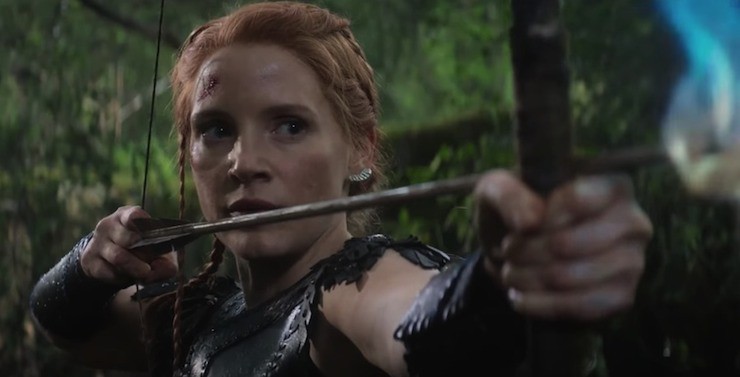
Sara fake-betrays the group to keep Eric alive (she shoots an arrow and hits him right in the marriage necklace), and Freya gets the mirror, and Eric has to make a plan with his dwarven friends to fix the mess they’re in. When Queen Freya uses the mirror, Ravenna instantly comes back as a sort of half-alive/half-tied-to-the-mirror super being. Eric tries to kill Freya and gets captured. He tries to tell all his former fellow Hunstmen that they deserve a better future with love and families, and that they should fight with him to take the evil queens down. Ravenna is super into any idea that lets her murder EVERYONE, so she gets right on it, but her much nicer sister—who, after all, does refer to these soldiers as her children—puts up a great big wall of ice to spare them instant death. At that point, Ravenna laments baby sister’s weakness after all the work she put in to making her stronger, accidentally revealing that she *gasp* enchanted Freya’s baby daddy into killing their kid, so she would get powers and never have a happy ending full of love and stuff. It turns out that she needed the baby to die because the mirror informed her that her niece was going to grow up to be “the fairest of them all.” (Why the mirror told her when this kid was a baby, but later didn’t tell her until Snow White was nearly of age is a mystery—maybe the mirror reflects more of the user’s psyche than we realize?)
This is where I got most disappointed, truth be told. Because so far, we have two very interesting female baddies. Ravenna is power-crazy, and her magic centers around her beauty, which is an apt metaphor for the type of power women are expected to levy in modern world. Freya is a woman obsessed with removing herself from anything that could hurt her again, hence her Elsa-like powers. But her desires are still implicit in her surroundings, in children who she raises to fight and die in her name. It would have been fascinating if Ravenna’s motivations for destroying Freya’s life had been purely selfish to juxtapose the sisters utterly, if she had killed her sister’s child to keep control over Freya, to keep the total affections of the only person in the world that she appeared to care for. Instead, Ravenna gives a little rant about being jealous of Freya’s good fortune: “Did you think I never wanted a child!” she roars. Suddenly, Ravenna reveals that she would prefer to be loved and have a family, but those things simply “weren’t meant for me.” And yet again, everything in a female character’s life comes down to babies. Babies and husbands. Movie, you were so close! You almost didn’t do the lazy thing! But then you did it anyway.
Too bad it had to happen right there at the end. Freya and Eric take down Mirror-Ravenna, and Freya gets stabbed before the whole thing is over. She tells Eric and Sara that they’re lucky before she dies. So two ladies who couldn’t have romance or babies are gone, but it’s fine because Sara and Eric can totally have those things. Probably. At least, that’s what the movie seems to be about. Eric gives a speech about the power of love at one point and everything.
With all that said, this movie is fun enough to watch when you’re craving that bad movie cheesiness. Or Chris Hemsworth’s smile (and his come-and-go Scottish accent, which is hilarious). Or Charlize Theron’s ability to look gorgeous while screaming at people. It brought beautiful costumes into this world, and also has bracket narration by Liam Neeson. So, you know, it might be your thing. And if so, you’re sure to have a good time.
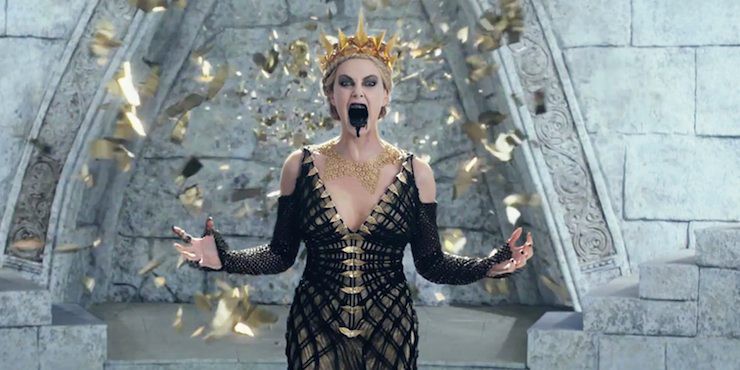
Emmet Asher-Perrin thinks this probably explains a lot of why she loved Spock, too. You can bug her on Twitter and Tumblr, and read more of her work here and elsewhere.










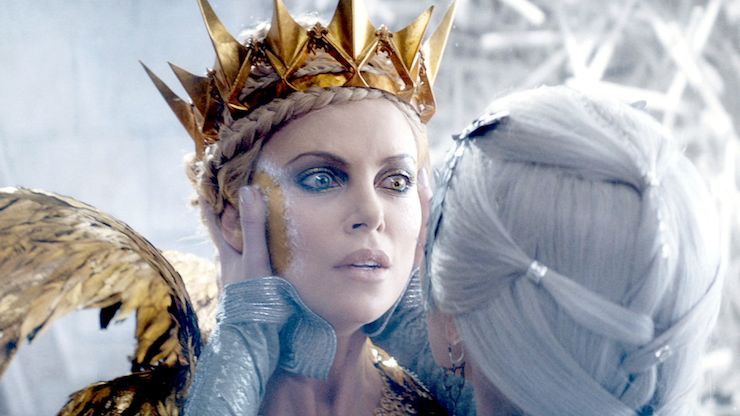
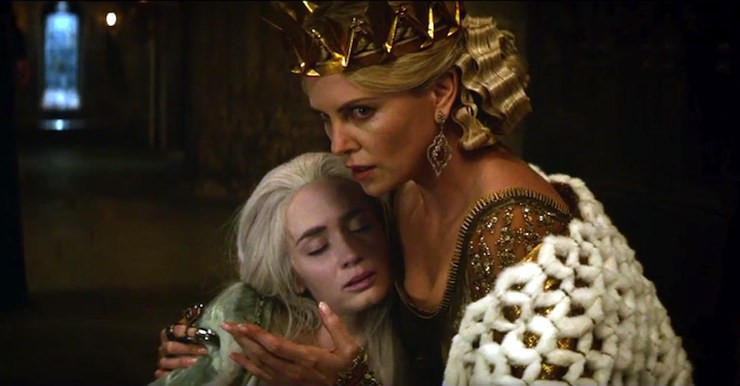
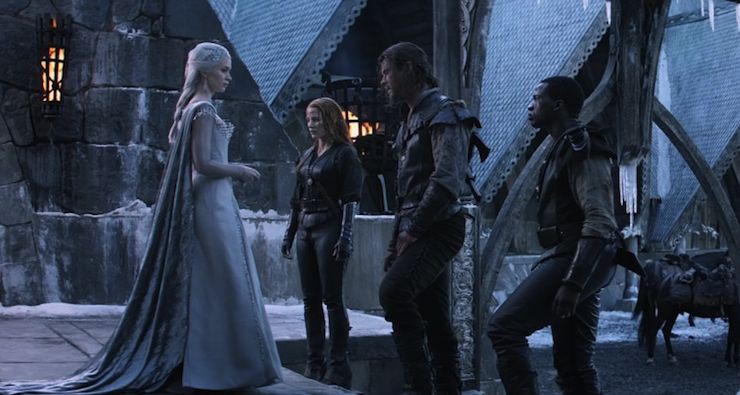
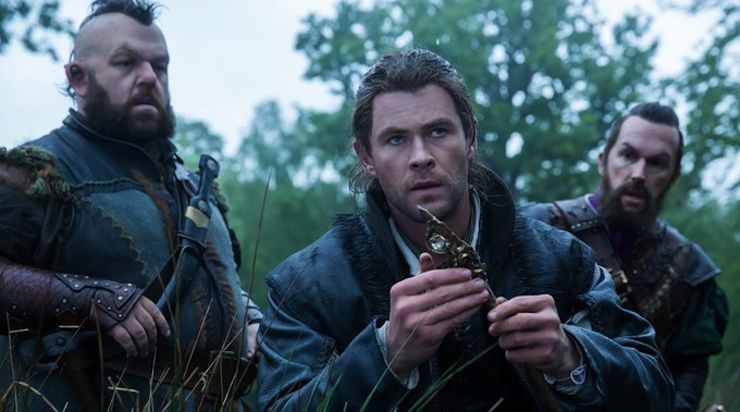
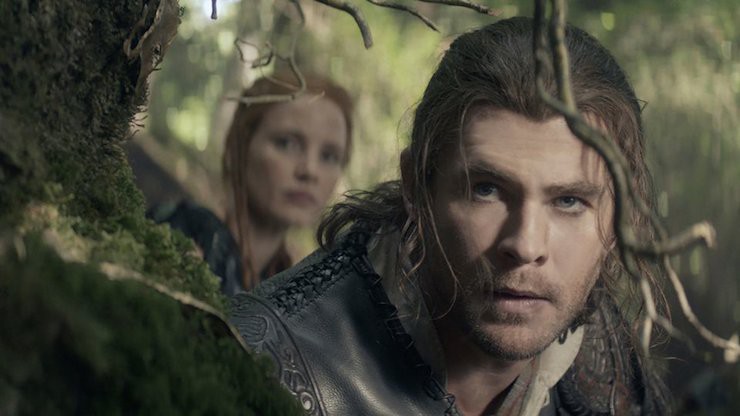
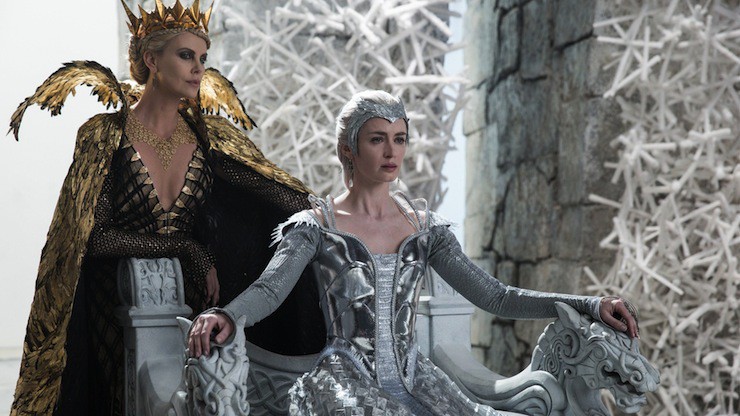
I mostly agree with all your points for this movie (I also hated the first film and kinda loved the prequel/sequel).
But I really don’t think the costumes are better than the first one.
Especially Freyas dress – the one which is shown on the Screencap above – looks so plasticlike “cheap”.
Also: Special Effects have been better in SNOW WHITE AND THE HUNTSMAN. I somehow think that WINTERS WAR is the better movie storytelling wise (which is what matters in the end to me), but SNOW WHITE AND THE HUNTSMAN visually looks like they had a far bigger budget.
I’m picturing the executive from The Simpsons in a replay of the scene in which ‘Poochie’ is created…
“We need a character who’s both Elsa and Daenerys.”